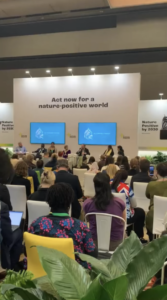- Home
- /
- Climate Blog
- /
- COP15 Biodiversity Conference in Montreal a Success
Helene is a senior at McGill University in Montreal Canada
The UN Biodiversity Conference COP15 and related meetings provided the global community with further opportunities to galvanize efforts at all levels to build a better future in harmony with nature by 2050. The conference led to the adoption of the Kunming-Montreal Global Biodiversity Framework. This historic biodiversity agreement includes key global targets to protect and restore nature, ensure its sustainable use, and spur investments for a green global economy. Major goals and targets include:

The Kunming-Montreal agreement will accelerate ambitious policies worldwide, allow businesses to take responsibility for biodiversity, target harmful subsidies, and increase the mobilization of finance for biodiversity by at least USD 200 billion per year by 2030.
Furthermore, the new Global Biodiversity Framework Fund was established under the Global Environment Facility as part of the agreement. This international solidarity package is particularly for the most vulnerable and biodiverse countries.